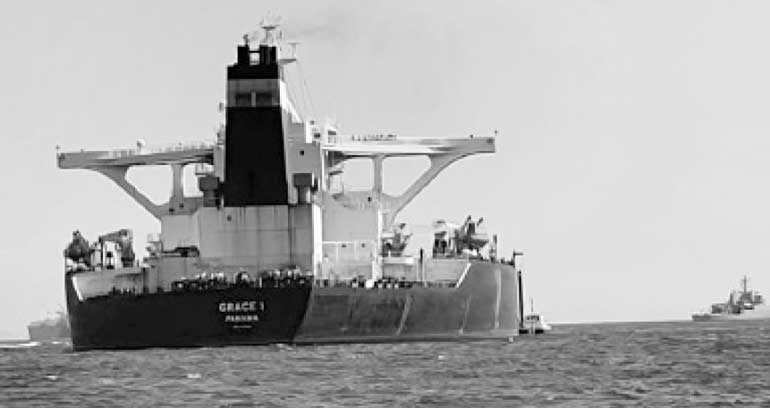Sunday Feb 22, 2026
Sunday Feb 22, 2026
Saturday, 6 July 2019 00:00 - - {{hitsCtrl.values.hits}}

Oil supertanker Grace 1 on suspicion of being carrying Iranian crude oil to Syria is seen near Gibraltar, Spain - Reuters
LONDON/DUBAI (Reuters): British Royal Marines seized a giant Iranian oil tanker in Gibraltar on Thursday for trying to take oil to Syria in violation of EU sanctions, a dramatic step that drew Tehran’s fury and could escalate its confrontation with the West.
The Grace 1 tanker was impounded in the British territory on the southern tip of Spain after sailing around Africa, the long route from the Middle East to the mouth of the Mediterranean.
Iran’s Foreign Ministry summoned the British ambassador to voice “its very strong objection to the illegal and unacceptable seizure” of its ship. The diplomatic gesture lifted any doubt over Iran’s ownership of the vessel, which flies a Panama flag and is listed as managed by a company in Singapore.
Panama’s Maritime Authority said on Thursday that Grace 1 was no longer listed in Panama’s international boat registry as of 29May.
US national security adviser John Bolton said the British move was “excellent news.”
“America and our allies will continue to prevent regimes in Tehran and Damascus from profiting off this illicit trade,” Bolton said on Twitter.
Shipping data reviewed by Reuters suggests the tanker was carrying Iranian oil loaded off the coast of Iran, although its documents say the oil is from neighbouring Iraq.
While Europe has banned oil shipments to Syria since 2011, it had never seized a tanker at sea. Unlike the United States, Europe does not have broad sanctions against Iran.
“This is the first time that the EU has done something so public and so aggressive. I imagine it was also coordinated in some manner with the US given that NATO member forces have been involved,” said Matthew Oresman, a partner with law firm Pillsbury Winthrop Shaw Pittman who advises firms on sanctions.
“This is likely to have been meant as a signal to Syria and Iran – as well as the US – that Europe takes sanctions enforcement seriously and that the EU can also respond to Iranian brinkmanship related to ongoing nuclear negotiations,” he said. Authorities in Gibraltar made no reference to the source of the oil or the ownership of the ship when they seized it.
But Iran’s acknowledgment that it owned the ship, and the likelihood that its cargo was also Iranian, drew a link between the incident and a new US effort to halt all global sales of Iranian crude. Iran describes that as an illegal “economic war.”
European countries have so far tried to appear neutral in the escalating confrontation between Tehran and Washington, which saw the United States call off air strikes against Iran just minutes before impact last month, and Tehran amass stocks of enriched uranium banned under a 2015 nuclear deal.
The Gibraltar government said it had reasonable grounds to believe that the Grace 1 was carrying crude oil to the Baniyas refinery in Syria.
“That refinery is the property of an entity that is subject to European Union sanctions against Syria,” Gibraltar Chief Minister Fabian Picardo said. “With my consent, our port and law enforcement agencies sought the assistance of the Royal Marines in carrying out this operation.”
A spokesman for British Prime Minister Theresa May welcomed Gibraltar’s move.
Spain, which challenges British ownership of Gibraltar, said the action was prompted by a US request to Britain and appeared to have taken place in Spanish waters. Britain’s Foreign Office did not respond to a request for comment.
Iran has long been supplying its allies in Syria with oil despite sanctions against Syria. What is new are US sanctions on Iran itself, imposed last year when President Donald Trump pulled out of an agreement that had guaranteed Tehran access to world trade in return for curbs on its nuclear program.
Those US sanctions have been tightened sharply since May, effectively forcing Iran from mainstream oil markets and making it desperate for alternative customers. Iran has grown more reliant on its own tanker fleet to transport whatever oil it can sell and to store a growing stockpile of unsold output.